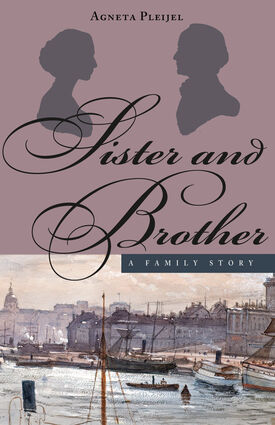
This literary biography traces the lives of two cultural figures in Swedish history, a sister and her deaf brother, and emphasizes their shared struggles.
Description
In this historical narrative, Swedish novelist Agneta Pleijel follows the lives of two ancestors, a sister and brother, each of whom played a role in the cultural life of Stockholm in the 19th century. Using old letters, records, and stories passed down through her family, Pleijel imagines the lives of her great-grandfather, Albert Berg (1832–1916), and his younger sister, Helena Berg Petre (1834–1880), who were born into a prominent musical family. Albert was born deaf, dashing his father’s hopes of a musical career for him. He was sent to Stockholm’s Manilla School for the Deaf, where he learned sign language. He later studied art and became a painter of seascapes. His interest in improving the lives of deaf people led him to become an advocate for the Deaf community and to cofound the Stockholm Deaf Association.
Helena showed early musical talent and, trained by her father, was a gifted singer. She lived in Paris for a time and enjoyed popular success. She fell in love with a musician but was plunged into despair when he died from cholera. Her father persuaded her to give up singing and marry a cold industrialist, who was one of the wealthiest men in Sweden, in order to provide financial support for the family. Helena struggled in the loveless marriage and battled depression throughout her life.
Despite their disparate lives, Albert and Helena faced similar struggles with communication, autonomy, and self-determination. Albert’s story traces the development of his own sense of identity as well as the development of Swedish Deaf culture, while Helena’s life reflects the silencing and oppression endured by women. In Sister and Brother, Pleijel’s literary treatment of their lives sheds light on the cultural and social norms that shaped the experiences of deaf people and women in the 19th century.
Agneta Pleijel is one of Sweden’s foremost novelists as well as a playwright, poet, and essayist. For several years she was a critic and cultural director at one of the largest daily newspapers in the Nordic countries. She is the recipient of several literary prizes and her books have been translated into more than twenty languages.
Reviews
Praise for the Swedish edition
— Nina Lekander, Expressen
"This is a book that contains so much that is terribly exciting, from that time and now: Sweden and Europe, speech and silence, opera and painting, gender and class, standards and deviation, virtue, lust, and dishonor. And there is more in this winding, engaging family chronicle...along with occasional epiphanies, presented in simple, precise but sometimes lyrical and striking language."
"And it is undeniably of deep significance...that language is central—the language that Albert has to fight to gain and the language of music that Helena, despite the best conditions, fails to develop."
— Ellen Mattson, Svenska Dagbladet
"Sister and Brother aptly captures contemporary views on what it meant to be a woman, as well as being deaf, in a deeply patriarchal and ableist environment (and) provides a rich tableau of experiences of deafness, social exclusion, and community. The novel has a double-appeal: for the nonacademic reader to become intrigued with the rich culture and history of deafness and for the (disability) scholar to get a glimpse into the little-known situation of deaf people in nineteenth-century Sweden...a highly pleasurable read."
— H-Net Reviews in the Humanities and Social Sciences